7 Easy Ways To Drink More Water & Stay Hydrated
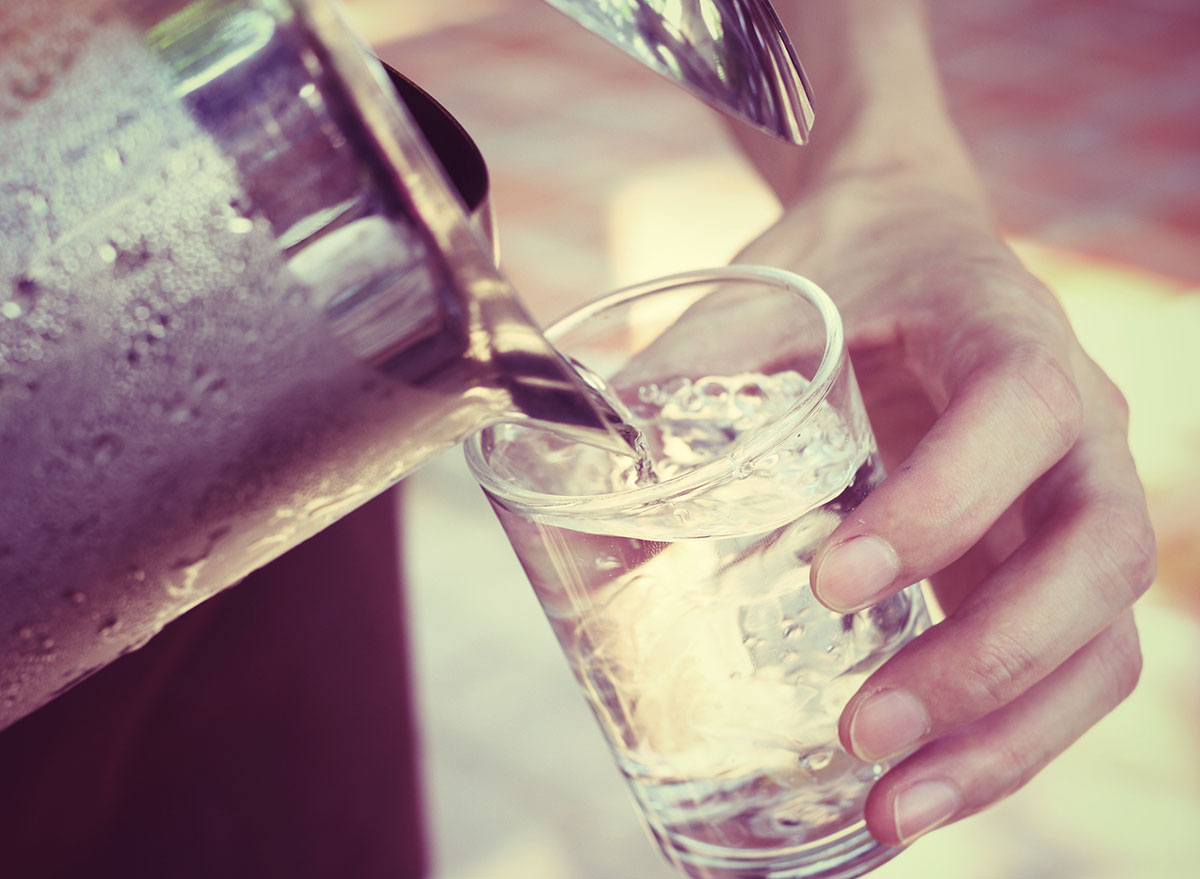
Drinking more water to ensure you remain well-hydrated throughout the day can only improve your health for the better. And now that summer is just around the corner, it’s the perfect time to make sure hydration is a healthy habit in your regular routine. But if you aren’t currently prioritizing staying hydrated, the thought of changing this may seem challenging or even intimidating. So how do you drink more water daily without it seeming like an arduous, disruptive chore?
To find out more about the importance of healthy hydration and get advice on easy ways to drink more water throughout the day, we spoke to three dietitians from our Medical Expert Board. Keep reading to get their insight on the value of H2O and how to drink more of it—and if you’re still thirsty for knowledge, quench it by discovering What Happens to Your Body When You Drink Lemon Water.
Why is hydration important?
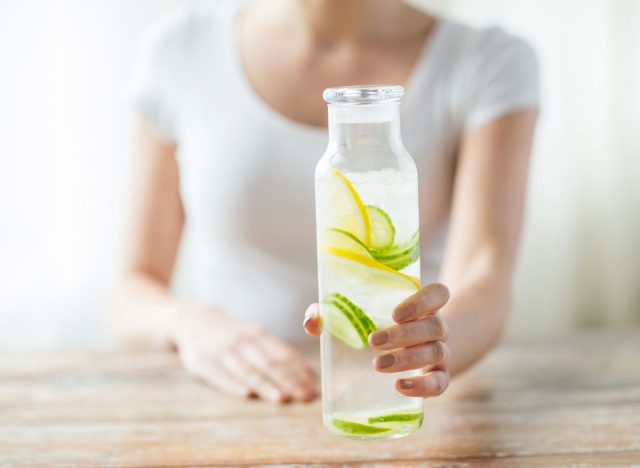
“Your body is made up of 50–70% water, and it depends on water in order to function properly. Every cell, tissue, and organ in the body needs water in order to function,” says Toby Amidor, MS, RD, CDN, FAND, award-winning nutrition expert and Wall Street Journal bestselling author of Up Your Veggies: Flexitarian Recipes for the Whole Family.
“Maintaining adequate hydration is important for many reasons,” adds Lauren Manaker, MS, RDN, registered dietitian and author of The First Time Mom’s Pregnancy Cookbook and Fueling Male Fertility. “Being hydrated may help people combat brain fog; it can help the body flush out toxins, and it can even help people lose weight in certain cases. It also helps the body maintain an appropriate temperature, and it helps keep joints lubricated.”
“Water makes up a large percentage of the blood, which carries essential nutrients to your cells and also carries waste material to your kidneys,” says Amidor. “[This is] then excreted from your body through the urine. It also helps regulate your body temperature through sweat and promotes healthy stool, which keeps your digestive tract working properly and helps keep you regular,” Amidor elaborates.
“Optimal hydration also helps maintain energy levels; water is needed to carry nutrients to cells,” says Greene. Additionally, Greene notes that “being chronically dehydrated can lead to digestive issues, kidney stones, and high blood pressure.”
“You lose water daily through processes like sweating, making urine, and having bowel movements,” Amidor explains concerning the effects of dehydration. “When you lose more fluids than you take in, your body ends up not having enough water to function properly at peak performance. As such, you can find yourself with headaches, dizziness, digestive issues (constipation), and fatigue. Dehydration can also affect your mood, memory, and cognitive ability in a negative manner. Once you rehydrate, these symptoms do subside.”
How much water should the average person drink each day to stay hydrated?
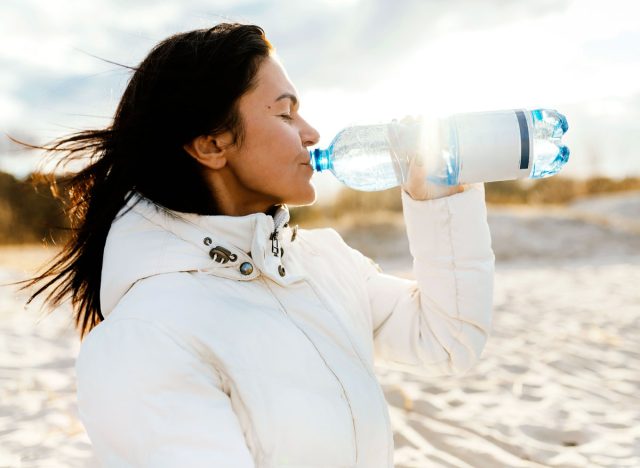
The Institute of Medicine has set an adequate intake (AI) of water for men at approximately 15.5 cups (3.7 liters) of total water a day and around 11.5 cups (2.7 liters) of total water a day for women.
“These estimates come from fluids from both food and beverages,” explains Amidor. “A person typically gets about 20% of the water they need from food, especially fruits and vegetables. Taking those percentages into account, it is estimated that women need about 9 cups of fluids per day and men need about 12.5 cups of fluids per day for proper hydration.”
“However, there is more to the story—and how much water [or] fluids you need [varies between] individuals based on several factors,” says Amidor. According to Amidor, these factors include:
- Exercise: “Any activity that makes you sweat means you need to consume extra fluids to replenish the amount that was lost,” she says.
- Environment: “The hotter or more humid the weather, the more you’re likely to sweat—and the more water you need to drink,” explains Amidor. “Dehydration is also more likely to occur at higher altitudes like if you’re hiking, skiing, or visiting an area of high elevation.”
- When you’re sick: “If you are sick and exhibit symptoms of fever, diarrhea, or vomiting, your body is losing water/fluids,” says Amidor. “So it’s important to drink more water and follow your doctor’s recommendations if anything additional is needed.”
- During pregnancy and while breastfeeding: “During these life stages, there are many more metabolic reactions going on in the body for both mom and baby. As such, they require more fluid/water intake per day,” advises Amidor.
Sydney Greene, MS, RDN, agrees that how much water you should drink each day ultimately varies across individuals based on their unique body chemistry and needs relative to their environment.”The amount of water someone needs to drink in order to be hydrated and feeling their best is very individual,” she says. “As a general rule of thumb, it is best to drink roughly half your body weight in ounces per day,” she suggests.
How to drink more water daily
Here are a few expert-approved tips to help you drink more water, which you can seamlessly incorporate into your regular routine with ease. These tips will not only help you drink more water but also will enable you to stay hydrated throughout the day without having to give it a second thought.
1. Eat hydrating foods
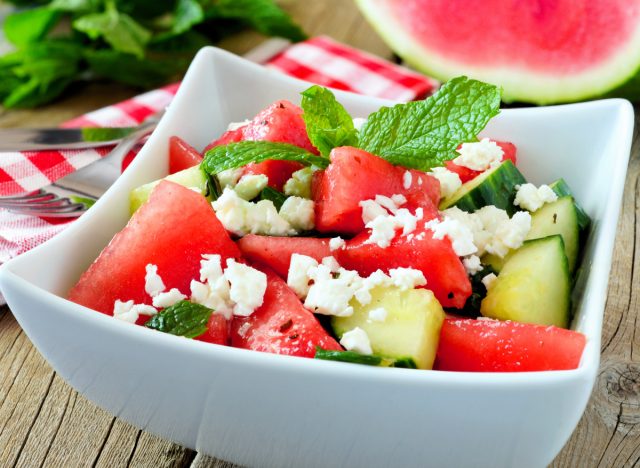
“Remember that foods like watermelon and cucumber are mostly water. Because of this, choosing these foods can help people maintain their hydration simply by snacking,” advises Manaker, “Bonus? These foods have natural electrolytes, which can help promote a healthy hydration status too. Watermelon is 92% water and it contains the electrolytes magnesium and potassium.”
2. Set alarms for yourself
“Set an alert to go off on your phone every hour,” suggests Greene. “I will sometimes have clients put a note in their calendar on the hour that says ‘time to drink.'”
3. Treat yourself to a large reusable water bottle
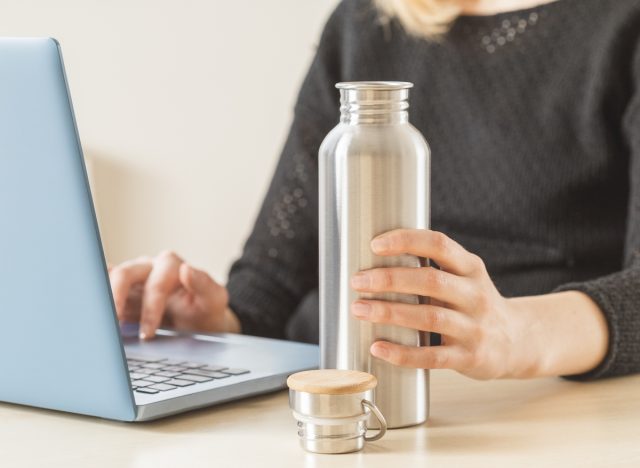
“Purchasing a large water bottle (about 40 oz.) can also be a helpful way to drink more water,” says Greene. “It may seem overly simple, but buying a water bottle with a straw or having reusable straws at home to put into cups can make sipping water much easier.”
“Start by aiming to drink at least one full bottle per day, and work your way up to two bottles from there,” she adds.
4. Prep your water overnight & make sure it’s accessible throughout the day
Manaker suggests that you “fill a water bottle at night and put it in the fridge. That way, you will have a beverage ready to grab on busy mornings, eliminating your excuse that you have ‘no time’ to fill a water bottle when you are juggling the morning rush,” she adds.
“Sometimes you just can’t carry all your daily water with you,” says Amidor. “That is when a nice water bottle is a good idea—keep it next to you and sip throughout the day and refill it when needed.”
5. Try flavor-infused water
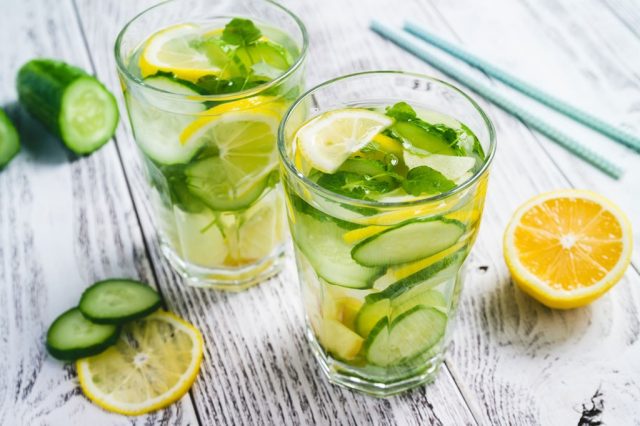
“Lean on infused water if you need a little flavor,” suggests Manaker. “A touch of 100% fruit juice added to plain water can add some much-needed flavor too, especially for those who don’t enjoy the taste of plain H2O.”
Adding a twist of lemon, lime, or grapefruit to blasé water can also give the taste of your drink a bit more edge without compromising the health integrity of this drink. Lemon water, in particular, has been linked to various health benefits, many of which I experienced firsthand when I Drank Lemon Water Every Morning for 30 Days & Noticed These 5 Life-Changing Effects.
6. When given a choice of beverage, always go for H2O
Sure, other drinks can hydrate your body—but all pale in comparison to a tall drink of water. “Instead of sugary sodas or large Venti cups of fancy coffee, opt for water or sparkling water—which is calorie-free,” says Amidor.
7. Listen to your body
Sometimes the most obvious solution is the most beneficial. According to Amidor, appropriately responding to internal cues your body sends is one of the most effective ways to stay hydrated. “Drink when you’re thirsty,” says Amidor. “Thirst is your body’s way of telling you that you need fluids.”
- Source: https://www.usgs.gov/special-topics/water-science-school/science/water-you-water-and-human-body#:~:text=In%20adult%20men%2C%20about%2060,their%20bodies%20made%20of%20water.
- Source: https://www.ncbi.nlm.nih.gov/pmc/articles/PMC2908954/
- Source: https://www.ncbi.nlm.nih.gov/pmc/articles/PMC6068860/
- Source: https://www.ncbi.nlm.nih.gov/pmc/articles/PMC2929932/
- Source: https://nap.nationalacademies.org/read/10925/chapter/6#139
- Source: https://www.uclahealth.org/news/15-food-that-help-you-stay-hydrated#:~:text=Your%20body%20typically%20gets%20about,increasing%20your%20daily%20water%20intake.







